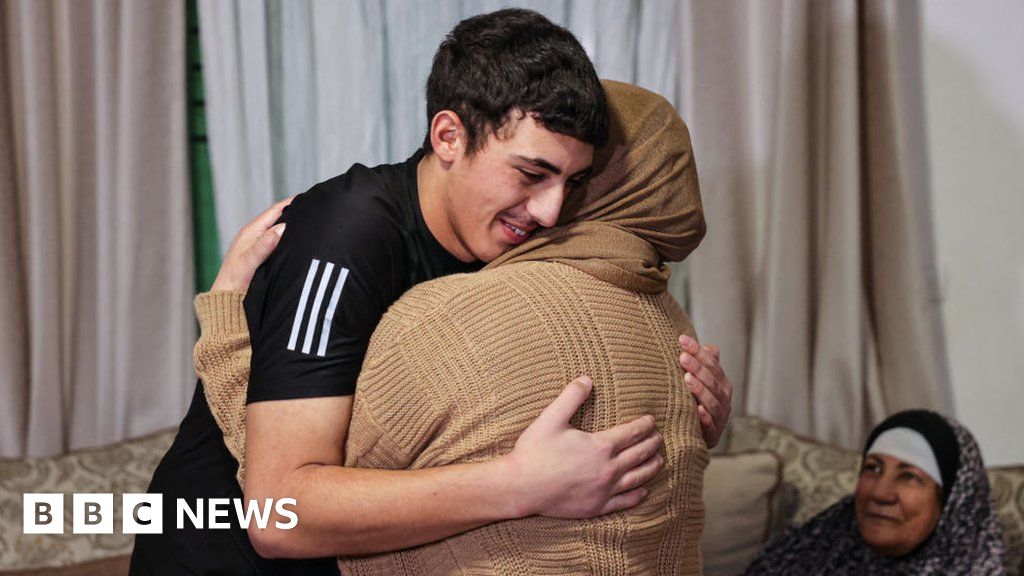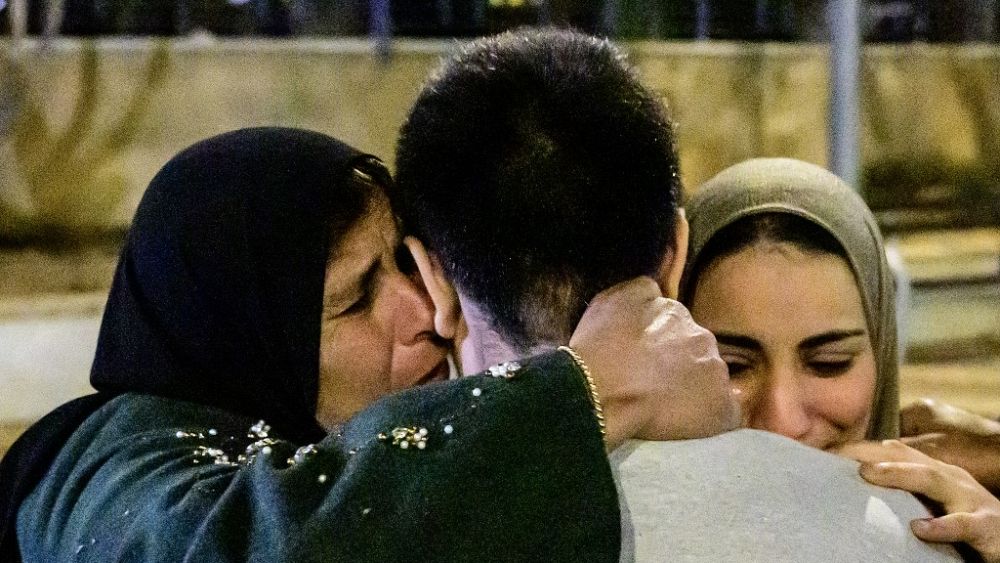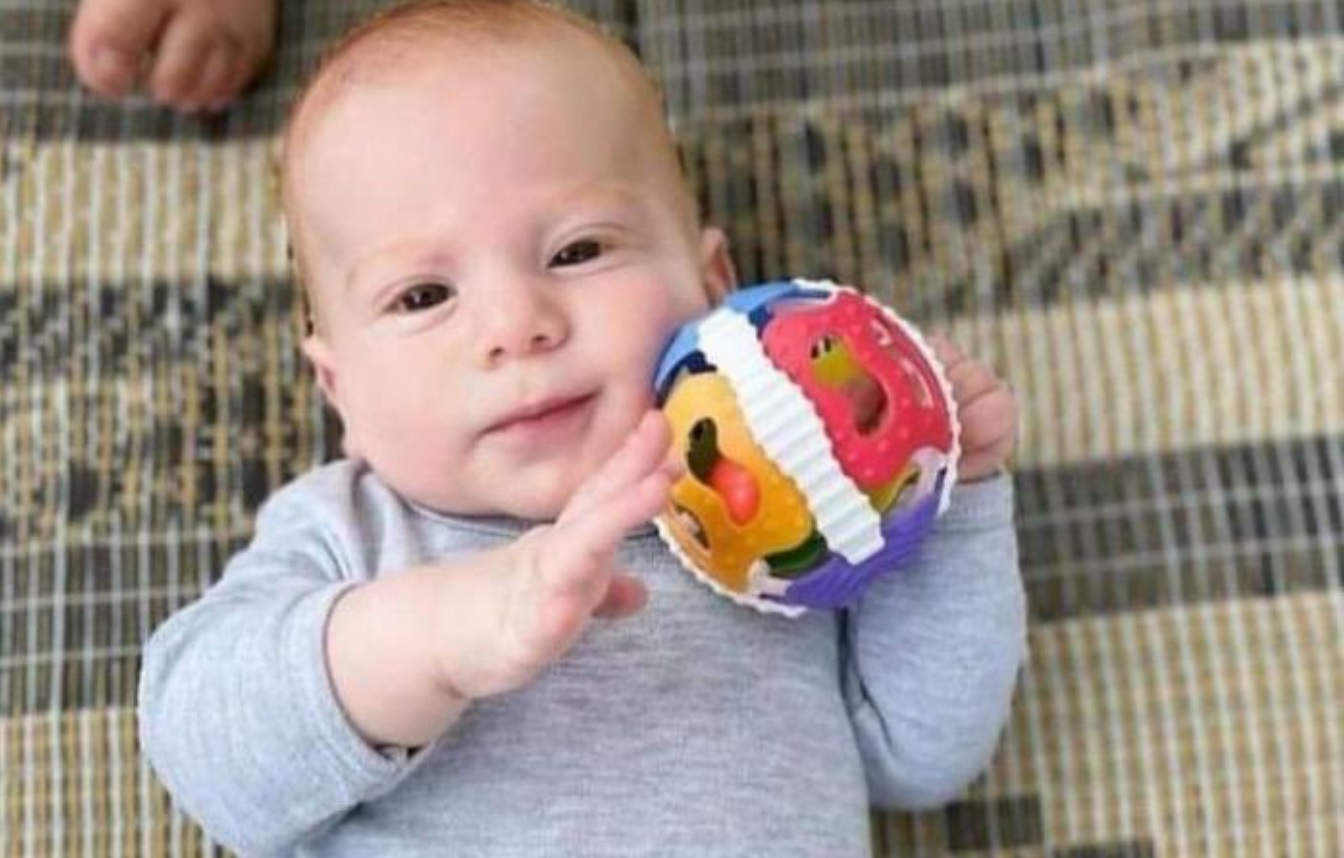Theguardian
More Israeli hostages and Palestinians freed as ceasefire extension agreed
A.Davis3 months ago
Eleven more Israeli hostages have been freed from Gaza in return for dozens of Palestinians held in Israeli jails, as the two sides agreed to extend the existing ceasefire by two days. Hamas released the hostages – nine children and two women – late on Monday, with all of them from the Nir Oz kibbutz, officials from the community said. Qatar said the newly released hostages included three with French citizenship, two with German citizenship and six Argentinian citizens. The releases brought “a sigh of relief to our community, however we remain deeply concerned about our loved ones that are still held hostage,” kibbutz official Osnat Peri said. It brings the total number Hamas has released since Friday to 58. Images released by the Israeli military showed French-Israeli child Eitan Yahalomi reunited with his mother, who gripped him tightly to her. The Israel Defence Forces (IDF) said the group had medical assessments before being reunited with their families. It said it would continue to work for the return of all abductees and asked people to respect the privacy of those who have been freed. Shortly afterwards, the release of another 33 Palestinian prisoners – 30 children and three women – was confirmed by Israel’s prison authority. It was the last exchange under the initial ceasefire deal. In East Jerusalem, prisoner Muhammad Abu Al-Humus called his release “an indescribable joy” and kissed his mother’s hand as he entered his home, while crowds in the West Bank town of Beitunia waved green Hamas flags to greet those arriving on a coach. Palestinian prisoners freed from the Ofer Israeli military prison react as they are greeted by crowds awaiting their return in Beitonia, near Ramallah. Photograph: Alaa Badarneh/EPA But nearby there were also clashes with Israeli troops close to Ofer prison, with Palestinians burning tyres and throwing stones. The Palestinian health ministry said one person was killed by Israeli forces. The latest developments came after Hamas said it had agreed to extend the four-day truce by 48 hours after the intervention of Qatar and Egypt, the principal mediators for the initial agreement, and with the same conditions. The US national security council spokesperson, John Kirby, said that “in order to extend the pause, Hamas has committed to releasing another 20 women and children”. Israel has not commented on any agreement to extend the truce but, in what may be an implicit confirmation, the Israeli prime minister’s office said the government had approved the addition of 50 female prisoners to its list of Palestinians for potential release if additional Israeli hostages are freed. António Guterres, the UN secretary general, hailed the extension as “a glimpse of hope and humanity in the middle of the darkness of war”. This week, US secretary of state Antony Blinken will pay his third wartime visit to the Middle East, meeting Israeli prime minister Benjamin Netanyahu in Tel Aviv and Palestinian president Mahmoud Abbas in Ramallah. “The secretary will stress the need to sustain the increased flow of humanitarian assistance to Gaza , secure the release of all hostages and improve protection to civilians in Gaza,” a senior US official said. He will discuss “the principles he laid out for the future of Gaza and the need to establish an independent Palestinian state,” the official added. There are widespread fears that any break in the conflict that has devastated swathes of Gaza and killed many thousands of civilians will only be brief.
Palestinian prisoners freed from the Ofer Israeli military prison react as they are greeted by crowds awaiting their return in Beitonia, near Ramallah. Photograph: Alaa Badarneh/EPA But nearby there were also clashes with Israeli troops close to Ofer prison, with Palestinians burning tyres and throwing stones. The Palestinian health ministry said one person was killed by Israeli forces. The latest developments came after Hamas said it had agreed to extend the four-day truce by 48 hours after the intervention of Qatar and Egypt, the principal mediators for the initial agreement, and with the same conditions. The US national security council spokesperson, John Kirby, said that “in order to extend the pause, Hamas has committed to releasing another 20 women and children”. Israel has not commented on any agreement to extend the truce but, in what may be an implicit confirmation, the Israeli prime minister’s office said the government had approved the addition of 50 female prisoners to its list of Palestinians for potential release if additional Israeli hostages are freed. António Guterres, the UN secretary general, hailed the extension as “a glimpse of hope and humanity in the middle of the darkness of war”. This week, US secretary of state Antony Blinken will pay his third wartime visit to the Middle East, meeting Israeli prime minister Benjamin Netanyahu in Tel Aviv and Palestinian president Mahmoud Abbas in Ramallah. “The secretary will stress the need to sustain the increased flow of humanitarian assistance to Gaza , secure the release of all hostages and improve protection to civilians in Gaza,” a senior US official said. He will discuss “the principles he laid out for the future of Gaza and the need to establish an independent Palestinian state,” the official added. There are widespread fears that any break in the conflict that has devastated swathes of Gaza and killed many thousands of civilians will only be brief. A protester walks near burning tyres in the occupied West Bank. Photograph: Fadel Senna/AFP/ Yoav Gallant, Israel’s defence minister, told troops on Monday that when fighting recommenced its “strength will be greater, and it will take place throughout the entire strip”. “You now have a few days, we will return to fighting, we will use the same amount of power and more,” Gallant said. Israel’s prime minister, Benjamin Netanyahu, has pledged to crush Hamas. The White House welcomed the agreement to extend the truce. Joe Biden said the deal had been achieved “through extensive US mediation and diplomacy”, adding: “We are taking full advantage of the pause in fighting to increase the amount of humanitarian aid moving into Gaza, and we will continue our efforts to build a future of peace and dignity for the Palestinian people.” International pressure for an extension of the ceasefire had been intense, with the US, the UN and the EU’s most senior diplomat calling on Israel not to restart its offensive in Gaza when the current truce was due to expire on Tuesday morning. Guterres pushed on Monday for a full humanitarian ceasefire instead of a temporary truce, which Israel has so far resisted. Guterres again called for the hostages held by Hamas to be released immediately and unconditionally, his spokesperson, Stéphane Dujarric said. Hamas had been reported to be seeking a four-day extension while Israel wanted day-by-day extensions. Splits within the militant organisation have complicated talks, as have difficulties communicating with leaders in Gaza. One Hamas official has suggested that the militant Islamist organisation might be ready to negotiate the release of some of the military personnel seized last month. The future of these hostages has not previously been discussed. There are still more than 7,000 Palestinian prisoners detained in Israel, many of them far more prominent than the children and women freed so far. Their freedom is thought to have been one of the main objectives of last month’s attacks. Yahya Sinwar , the leader of Hamas in Gaza, was released by Israel in 2011 after 23 years behind bars in a deal that saw more than 1,000 prisoners exchanged for a single Israeli soldier. The war was triggered when Hamas broke through the perimeter fence around Gaza on 7 October and attacked communities in southern Israel, killing more than 1,200 people, mostly civilians in their homes and at a music festival . More than 240 people were abducted, including infants, elderly people, disabled people, soldiers and foreign farm workers. Between 13,000 and 15,000 Palestinians have been killed by the Israeli offensive launched after the Hamas attack, roughly two-thirds of them women and children, according to the health ministry in Hamas-ruled Gaza . More than 1 million people have been forced from their homes. At least 57 journalists and media workers have been killed in the conflict so far, the Committee to Protect Journalists said on Monday. With Agence France-Presse
A protester walks near burning tyres in the occupied West Bank. Photograph: Fadel Senna/AFP/ Yoav Gallant, Israel’s defence minister, told troops on Monday that when fighting recommenced its “strength will be greater, and it will take place throughout the entire strip”. “You now have a few days, we will return to fighting, we will use the same amount of power and more,” Gallant said. Israel’s prime minister, Benjamin Netanyahu, has pledged to crush Hamas. The White House welcomed the agreement to extend the truce. Joe Biden said the deal had been achieved “through extensive US mediation and diplomacy”, adding: “We are taking full advantage of the pause in fighting to increase the amount of humanitarian aid moving into Gaza, and we will continue our efforts to build a future of peace and dignity for the Palestinian people.” International pressure for an extension of the ceasefire had been intense, with the US, the UN and the EU’s most senior diplomat calling on Israel not to restart its offensive in Gaza when the current truce was due to expire on Tuesday morning. Guterres pushed on Monday for a full humanitarian ceasefire instead of a temporary truce, which Israel has so far resisted. Guterres again called for the hostages held by Hamas to be released immediately and unconditionally, his spokesperson, Stéphane Dujarric said. Hamas had been reported to be seeking a four-day extension while Israel wanted day-by-day extensions. Splits within the militant organisation have complicated talks, as have difficulties communicating with leaders in Gaza. One Hamas official has suggested that the militant Islamist organisation might be ready to negotiate the release of some of the military personnel seized last month. The future of these hostages has not previously been discussed. There are still more than 7,000 Palestinian prisoners detained in Israel, many of them far more prominent than the children and women freed so far. Their freedom is thought to have been one of the main objectives of last month’s attacks. Yahya Sinwar , the leader of Hamas in Gaza, was released by Israel in 2011 after 23 years behind bars in a deal that saw more than 1,000 prisoners exchanged for a single Israeli soldier. The war was triggered when Hamas broke through the perimeter fence around Gaza on 7 October and attacked communities in southern Israel, killing more than 1,200 people, mostly civilians in their homes and at a music festival . More than 240 people were abducted, including infants, elderly people, disabled people, soldiers and foreign farm workers. Between 13,000 and 15,000 Palestinians have been killed by the Israeli offensive launched after the Hamas attack, roughly two-thirds of them women and children, according to the health ministry in Hamas-ruled Gaza . More than 1 million people have been forced from their homes. At least 57 journalists and media workers have been killed in the conflict so far, the Committee to Protect Journalists said on Monday. With Agence France-Presse


Read the full article:https://www.theguardian.com/world/2023/nov/28/israel-hamas-war-ceasefire-deal-extended-two-days-hostages-gaza-palestine
0 Comments
0




















